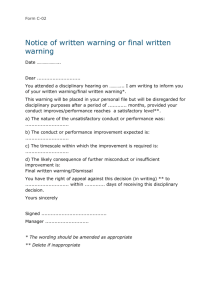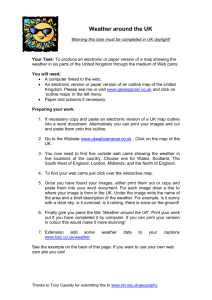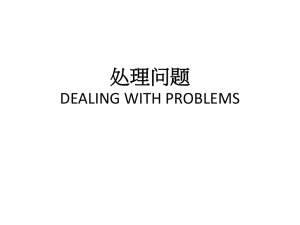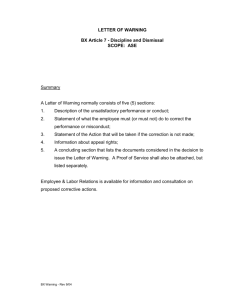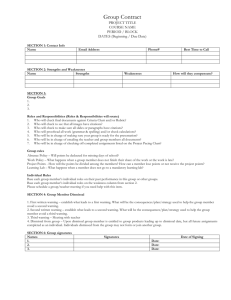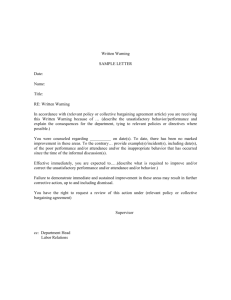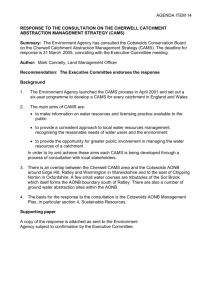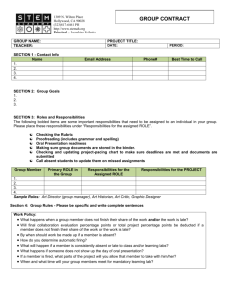SERCO AUSTRALIA PTY LIMITED
advertisement
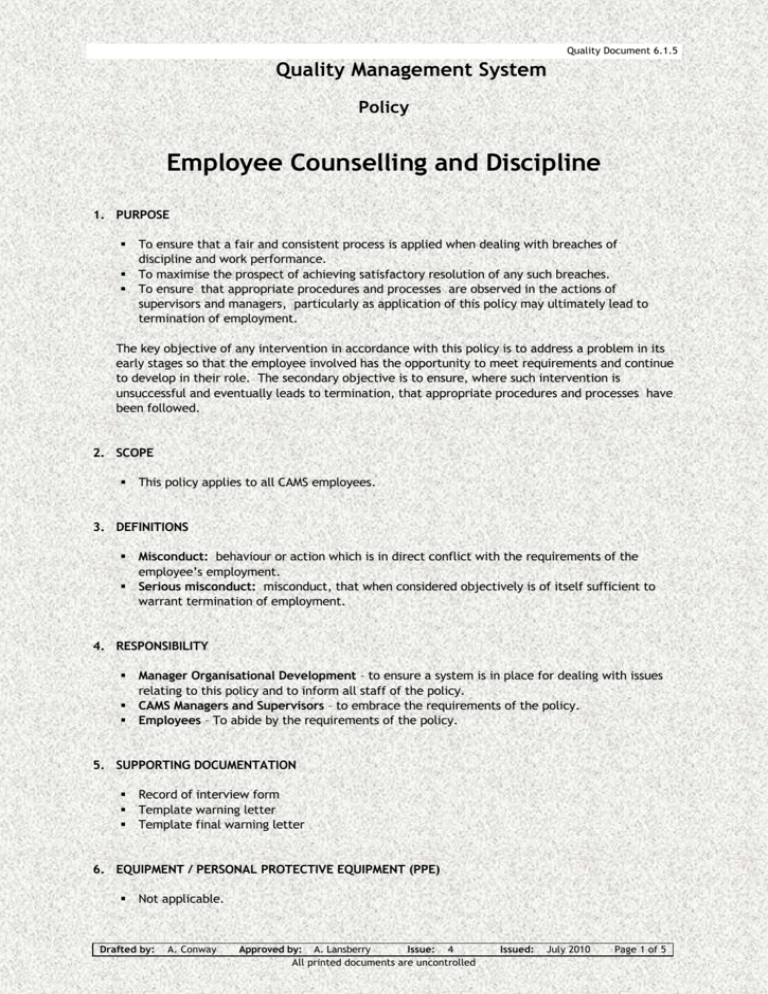
Quality Document 6.1.5 Quality Management System Policy Employee Counselling and Discipline 1. PURPOSE To ensure that a fair and consistent process is applied when dealing with breaches of discipline and work performance. To maximise the prospect of achieving satisfactory resolution of any such breaches. To ensure that appropriate procedures and processes are observed in the actions of supervisors and managers, particularly as application of this policy may ultimately lead to termination of employment. The key objective of any intervention in accordance with this policy is to address a problem in its early stages so that the employee involved has the opportunity to meet requirements and continue to develop in their role. The secondary objective is to ensure, where such intervention is unsuccessful and eventually leads to termination, that appropriate procedures and processes have been followed. 2. SCOPE This policy applies to all CAMS employees. 3. DEFINITIONS Misconduct: behaviour or action which is in direct conflict with the requirements of the employee’s employment. Serious misconduct: misconduct, that when considered objectively is of itself sufficient to warrant termination of employment. 4. RESPONSIBILITY Manager Organisational Development – to ensure a system is in place for dealing with issues relating to this policy and to inform all staff of the policy. CAMS Managers and Supervisors – to embrace the requirements of the policy. Employees – To abide by the requirements of the policy. 5. SUPPORTING DOCUMENTATION Record of interview form Template warning letter Template final warning letter 6. EQUIPMENT / PERSONAL PROTECTIVE EQUIPMENT (PPE) Not applicable. Drafted by: A. Conway Approved by: A. Lansberry Issue: 4 All printed documents are uncontrolled Issued: July 2010 Page 1 of 5 Quality Document 6.1.5 Quality Management System 7. SAFETY HAZARDS & RISK ASSESSMENT Not applicable. 8. ENVIRONMENTAL ISSUES Not applicable. 9. REQUIRED TRAINING All CAMS staff will be informed of this policy. Managers and supervisors to be trained in application of the policy. 10. PREAMBLE In order to maintain a well-organised company with an effective working environment, employees are required to perform their duties to a reasonable standard and no employee shall behave in such a way as to impair the working process for others, or in any way prejudices the good order and discipline of CAMS. Where an employee does not meet the required standards, CAMS will provide appropriate opportunity to rectify the situation and thereby enable the employee to continue in employment (unless the performance/misconduct warrants dismissal following receipt of a final warning, or summary dismissal based on the severity or the misconduct). In cases of poor performance, it is essential that the CAMS Performance Review process has been followed by the Manager/Supervisor, to ensure that all possible reasons for poor performance have been explored and appropriate action taken by the company including action under this policy to attempt to improve the employee’s performance via training and development plans. Continued failure to meet required performance standards after having been given adequate opportunity to do so, may result in an employee's employment being terminated. This policy provides the guidelines under which counselling and disciplinary action may arise to deal with misconduct or unsatisfactory work performance, and to ensure that efforts are directed first at rectification rather than separation. The existence of this policy does not preclude aspects of poor performance or low-level misconduct in the workplace being dealt with successfully at an informal level, leading to early and complete resolution. Where a need arises for a counselling and disciplinary process, the procedure detailed in this policy should be followed. 11. PROCEDURE 11.1 Counselling and Discipline A Record of Interview form has been developed in order to provide consistency of approach throughout CAMS. The purpose of this document is to record the basic points or allegations at issue, and the steps being followed to address them. The employee should receive a copy of this document immediately or shortly after the Drafted by: A. Conway Approved by: A. Lansberry Issue: 4 All printed documents are uncontrolled Issued: July 2010 Page 2 of 5 Quality Document 6.1.5 Quality Management System counselling discussion. Depending upon the counselling discussions and the employee’s response to the matters at issue, a letter may subsequently be prepared confirming the outcome of the counselling discussion and decisions taken during the discussion. Depending upon the severity of any misconduct or work performance issues, “warnings” including a final warning may be given before CAMS resorts to terminating employment when it is considered appropriate. CAMS reserves the right to proceed direct to the “final warning” stage, and/or, immediate termination of employment (Summary Dismissal). Where a final warning occurs, the employee’s performance/behaviour must reach the level specified, by the nominated time, or CAMS may terminate employment. The letter of warning will indicate whether the warning is final or stepped. At each formal counselling or disciplinary interview employees will be given the opportunity to provide a response to the matter. In addition employees may also organise a representative to be present at the interview(s). The employee may nominate a union representative in such a role. However, the employee may not make an unreasonable or impracticable nomination (for example, someone who is not able to attend within a short time-frame). In some circumstances the company may stand an employee down on full pay, while the issue is considered, or an investigation is warranted. In situations where this occurs the employee will be informed of the timing and length of the “stand down”. a. First Interview – Counselling The manager/supervisor shall discuss with the employee the problem, which may include poor performance or misdemeanour and if necessary decide on appropriate action to remedy the situation. The interview will be recorded on a Record of Interview form and may be followed by a letter of warning being issued to the employee. b. Second Interview Where a second interview is required and the manager/supervisor determines corrective action is needed, the employee shall be provided with a Record of Interview form and a warning in writing which may be a final warning, requiring the employee to be advised that dismissal may occur unless the problem is remedied by a specified time. c. Third Interview If there is a need for a third interview and the manager/supervisor determines it is warranted, he/she may recommend that CAMS issue a notice of dismissal to the employee or take such other action as deemed appropriate. The employee will in all cases be provided the opportunity to organise a representative to be present at an interview. The Manager Organisational Development is available to offer assistance in this matter and to be present at counselling/warning interviews if required. If the Manager Drafted by: A. Conway Approved by: A. Lansberry Issue: 4 All printed documents are uncontrolled Issued: July 2010 Page 3 of 5 Quality Document 6.1.5 Quality Management System Organisational Development is not available, or not required, then the manager/supervisor must, in all cases, arrange for an observer to be present. The General Manager should always be advised that disciplinary action is going to be taken. Life of Warning A first or second warning will normally remain active for a period of twelve months (unless a shorter period is agreed between CAMS and the employee), after which time (providing no further warnings are issued) the warning should expire and a note placed on the employee’s file to this effect. A final (third) warning will remain active for a period of twelve months, then if the employee’s performance for which they have been counselled has improved, the warning should drop one level in status to a second warning for a further period of six months. Then if performance in the area counselled is still satisfactory, it should drop down another level to a first warning/counselling status for another three months. After that the warning should expire and a note placed on the employee’s file to this effect. 11.2 Summary Dismissal CAMS reserves the right to terminate an employee's employment immediately and without notice in cases of proven serious misconduct as defined, including, but not limited to: failure to comply with a reasonable direction of the employer behaviour which in the opinion of the employer represents continuing and significant neglect of duty, or a material breach of responsibilities under the employment contract, or fraud, illegal acts, or serious misconduct prejudicial to CAMS or CAMS’ reputation. Examples of such behaviour include: serious breaches of the CAMS’ E-mail and Internet Use Policy serious breaches of CAMS’ Workplace Bullying, Harassment and Occupational Violence Policy stealing, misappropriation or breach of trust concerning money breach of confidentiality or security falsifying job application details, time cards or records falsifying worker’s compensation or insurance claims possession of an offensive or illegal weapon fighting or attempting to injure others being intoxicated or affected by illegal drugs while at work sabotage wilful destruction or damage of CAMS’ property wilful violation of safety regulations or company safety rules failure to act in accordance with any of the OH&S policies The above list is by way of example only and is not intended to be exhaustive. Summary dismissal can only occur after an employee has been given the opportunity to respond to any allegations of serious misconduct and the response and all other Drafted by: A. Conway Approved by: A. Lansberry Issue: 4 All printed documents are uncontrolled Issued: July 2010 Page 4 of 5 Quality Document 6.1.5 Quality Management System relevant material has been considered by CAMS prior to reaching a decision to dismiss the employee. 12. MAINTENANCE This policy will be reviewed in consultation with the Staff Consultative Committee every three years. 13. FLOW CHART Not applicable. Drafted by: A. Conway Approved by: A. Lansberry Issue: 4 All printed documents are uncontrolled Issued: July 2010 Page 5 of 5
